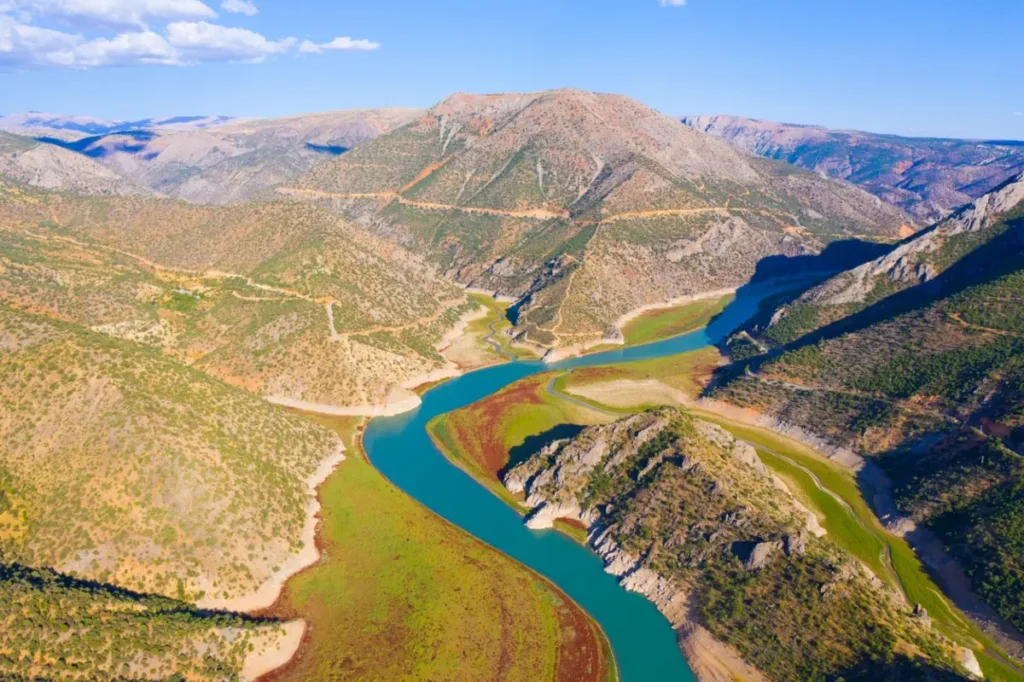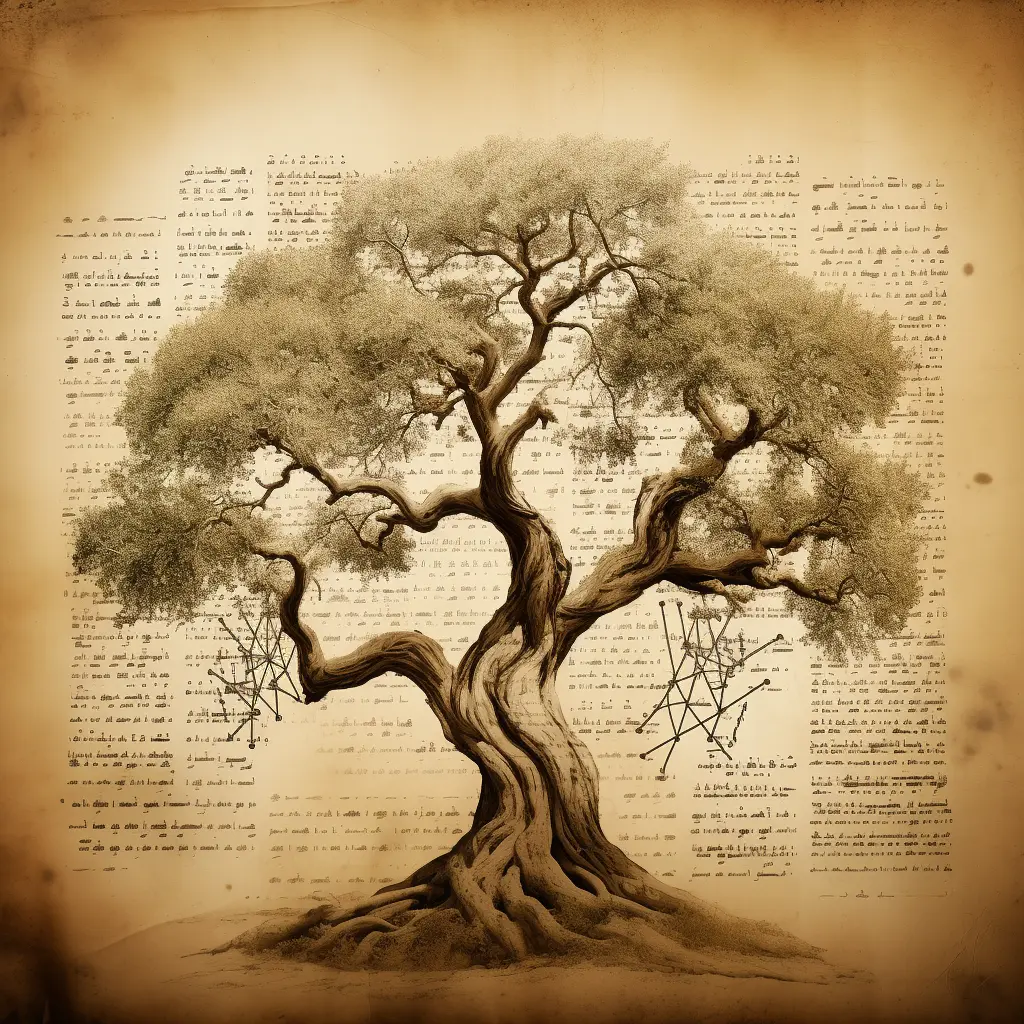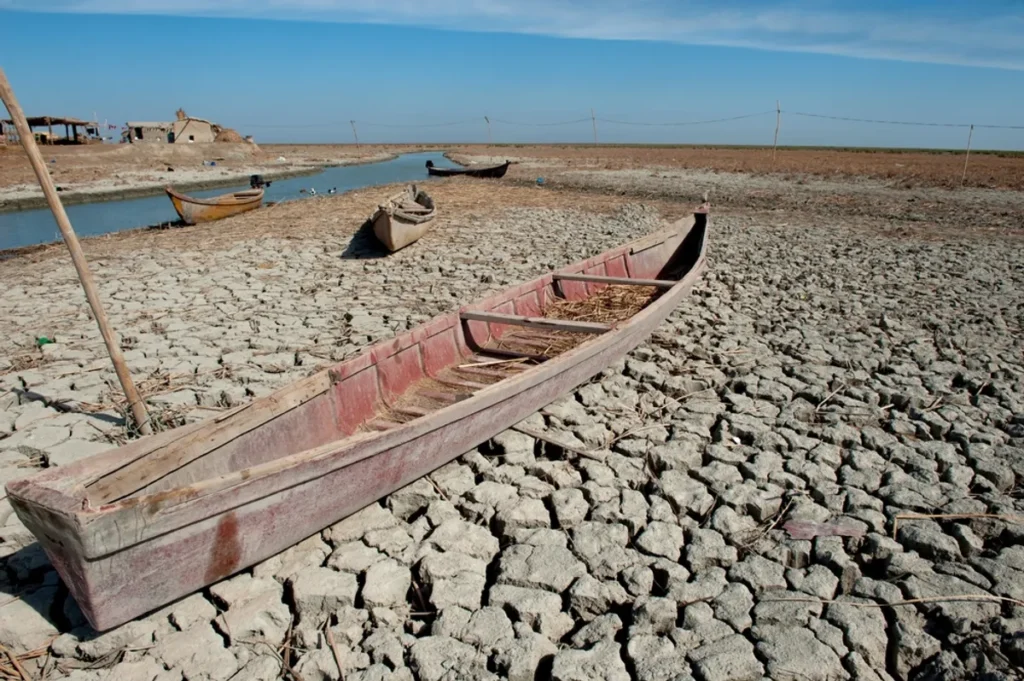
Brief Overview of the Euphrates River
The Euphrates River, a significant waterbody in Western Asia, originates in eastern Turkey, passes through Syria and Iraq, and ultimately merges into the Persian Gulf. The 2,800 km long river, coupled with the Tigris, plays a crucial role in defining the region famously known as ‘Mesopotamia,’ Greek for ‘land between the rivers.’ Historically, it’s been an essential lifeline, providing water and fertile soil and paving the way for civilizations like Babylon and Assyria. This iconic river also holds notable religious significance, being mentioned numerous times in the Bible. Its symbolism is, thus, deeply embedded in life-sustaining resources and spiritual beliefs.
Importance of the Euphrates in History and Geography
The Euphrates, one of the longest rivers in Western Asia, has been a significant element both in historical affairs and geographical layout. Being the lifeblood of ancient civilizations like Mesopotamia, it has been admired and venerated. This river also contributed monumentally to defining the Middle Eastern landscape, acting as a natural boundary and a vital source for agriculture and human settlement.
Significance in Ancient Civilizations
Euphrates in Mesopotamian Civilization
In the early cradle of civilization, the Euphrates River held a paramount role. Evolving alongside the Sumerians, Akkadians, Babylonians, and Assyrians, it served as a life source, symbolizing both sustenance and destruction. The river provided fertile soils for agriculture, enabling the growth of robust civilizations. Notably, it was seen as a divine gift, featuring heavily in their religious and mythological narratives. However, its unpredictable flooding also led to widespread devastation. This duality was reflected in their literature and art. Thus, the Euphrates was not merely a river but a potent symbol of life, divinity, and calamity in Mesopotamian culture.
Role of the Euphrates in Early Trade and Agriculture
The Euphrates River played an indispensable role in facilitating trade and agriculture during ancient times, underlining its significant contribution to early civilizations. Blessed with fertile soil and ample water supply, the trade agriculture thrived on its banks, leading to prosperous communities and the emergence of advanced cultures. This river provided an efficient route for trade, enabling the exchange of goods, ideas, and innovations over vast distances, thus stimulating economic growth. Moreover, agriculture flourished due to its high silt content soil, giving birth to the practice of systematic farming. Hence, the Euphrates embodied the essence of life, offering sustenance, economic prosperity, and cultural exchange.
Euphrates in Ancient Mythology and Religion
In numerous ancient mythologies and religions, the Euphrates River holds great significance and is often regarded as a divine figure itself. For instance, within Biblical storytelling, it’s considered one of the four rivers flowing out of the Garden of Eden, symbolizing fertility and life. Mesopotamian texts depict it as a vital lifeline and also a source of natural disasters, hence imbuing it with an aura of respect and fear. Moreover, various early religions conveyed it as a boundary between the mortal world and the supernatural realms, reflecting the river’s immeasurable influence on life, culture, and spiritual beliefs in ancient civilizations.
Related: Is The Euphrates River Drying Up?
Euphrates River in Biblical Symbolism
Biblical References to the Euphrates River
In biblical context, the Euphrates River holds deep significance, often symbolizing a boundary or limit. It is commonly referred to as one of the four rivers flowing from the Garden of Eden in Genesis 2:14, representing the birthplace of civilization and prosperity. In Revelation 16:12, the ‘kings from the East’ cross it, symbolizing the events leading to the end times. This river’s drying up signifies removing barriers, leading to the final battles between good and evil. Hence, the Euphrates serves as a powerful emblem signifying creation, prosperity, and the advent of transformative periods.
Euphrates as a Metaphor in Biblical Texts
In various scriptures, the Euphrates River is metaphorically elevated to a symbol of boundary and abundance. Its frequent biblical references often denote it as the outer edge of the Promised Land, encapsulating a sense of limit or a divine barrier. Additionally, its fertility and life-sustaining waters render it an emblem of prosperity and blessings. Stories in Genesis denote it as part of Eden’s Garden, amplifying its correlation with life and God’s grace. The river’s significance extends to the golden age prophecies, wherein it acts as a conduit for God’s blessings to flow onto his people.
Theological Interpretations of Euphrates Significance
Within the context of biblical symbolism, the Euphrates River carries profound theological significance. It is often referred to as one of the four rivers of Eden in the book of Genesis, associated with the Paradise or the Beginning, marking it as a symbol of divine origin and abundance. Additionally, in the book of Revelations, the Euphrates is depicted as a boundary between the righteous and the wicked, with its drying up signaling the impending end-times.
The river thus serves as a metaphorical line separating good from evil, embodying an eschatological meaning. Furthermore, it frequently acts as a point of transition in major biblical stories, further underscoring its symbolic role as a bridge between the divine and the earthly, the past and the future. Overall, the Euphrates is a powerful emblem of life, morality, and change in the biblical texts.
Euphrates in Modern Symbolism and Culture
Representations of Euphrates in Literature
Often portrayed as a sacred and life-giving entity in contemporary literary works, the Euphrates River exemplifies both sustenance and transformation. In numerous novels, poetry, and prose, it has been used as an emblem of birth, rebirth, and purity, underscoring its mythological status as the cradle of civilization.
It’s also frequently depicted as a site of conflict and division, reflecting the socio-political strife in the region it traverses. Many authors use the Euphrates as an effective narrative tool, delicately infusing themes relating to humanity’s complex relationship with nature, history, and the concept of ‘home’. Thus, in literature, it exemplifies a wealth of deep, multifaceted symbolic meanings.
Euphrates in Visual Arts and Music
In contemporary symbolism and culture, the Euphrates River figures significantly in visual arts and music, often used by artists and musicians to evoke strong images and sounds of peace, fertility, and divine providence. It is not uncommon to find sublime paintings that depict its serene free-flowing water or hear music that melodically capture its ambient sounds. For many, it presents a serene tableau of life’s rhythms, dramatic interplays of symbiosis, and a timeless testament to nature’s abundance. Similarly, musicians often use the Euphrates to invoke a sense of fluidity, progress and the mystery of unexplored journeys – making the river a transcendental symbol across various art forms.
Socio-Political Symbolism of the Euphrates River
Through the lens of social and political symbolism, the Euphrates River signifies a crossroads of culture, conflict, and cooperation. As a boundary marker between nations and cultures, particularly those of Iraq and Syria, it represents both division and connection. It is seen as a symbol of conflict given its history as a contested resource, leading to geographical disputes and ‘water wars.’ Simultaneously, it symbolizes cooperation, as campaigning for water rights and management has fostered negotiations between nations. Therefore, the Euphrates possesses a complex modern symbolism characterized by geopolitics and cultural identities.
Environmental Perspectives of the Euphrates
The Euphrates and Climate Change
In understanding the environmental implications of the Euphrates, one cannot overlook its tie-in with climate change. The river serves as a tangible barometer to gauge the impact of global warming. Rising temperatures have contributed to severe water shortages, coupled with unpredictable weather patterns. This has a profound impact on the ecosystems and biodiversity within and around the river. Excessive water extraction for agriculture has led to a decrease in its flow rate, signifying man-induced climate change effects. The Euphrates’ state is a stark reminder of the urgent need to mitigate human-induced climate change and adapt sustainable water management practices.
Conservation and Preservation Efforts
Efforts to conserve and preserve the Euphrates River are of paramount importance due to its vital role in the regions it spans. Straddling nations like Turkey, Syria, and Iraq, its waters are a critical resource for agriculture, hydroelectric power, and potable supply. However, environmental concerns have arisen due to the detrimental effects of pollution, over-extraction, and climate change. Several initiatives have been launched to address these issues.
Local communities, international organizations, and governments in these regions are collaborating on projects aiming to rehabilitate the river’s ecosystem, regulate water usage, and improve waste management processes. It also involves raising awareness about the importance of protecting this precious resource. Through these initiatives, the symbolic meaning of Euphrates as a life-giving force is being emphasized, reinforcing its significance not only as a life source for millions of people but also as a key biodiversity hotspot and an ally in tackling global climate change.
Conclusion
Summary of the Euphrates Symbolism
In a nutshell, the Euphrates River embodies life, prosperity, and civilization’s dawn, as corroborated by historical, biblical, and literary references. With its generous flow, it irrigates lands, nurtures civilizations, and symbolizes the abundance and continuance of life. However, its symbolism isn’t confined to fertility and prosperity. In various literary and religious contexts, it represents barriers to overcome, frontiers to cross, and sometimes even conveys a premonition of the end times. This duality accentuates its prominence in diverse narratives, enhancing its role as a profound and multifaceted symbol in our collective consciousness.
The Euphrates’ Relevance in Today’s World
To wrap it up, the Euphrates River isn’t only a historic emblem, but it’s also instrumental in contemporary affairs. With a major role in socio-economic functions and political dynamics, it continues to serve as a lifeblood for millions of people, making it a timeless symbol of life and civilization.



